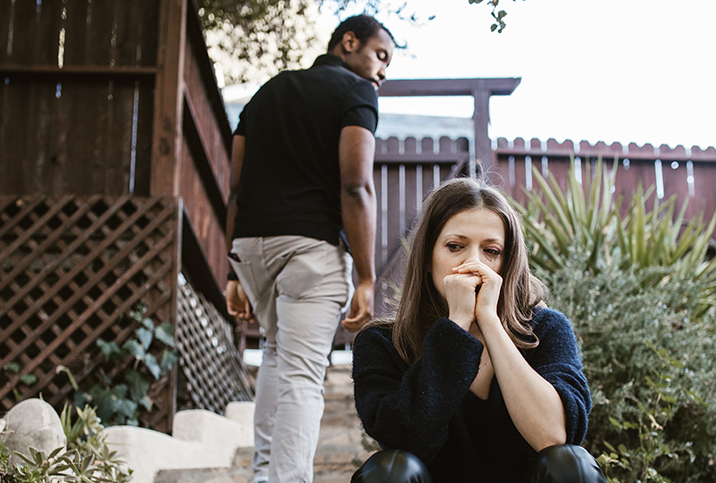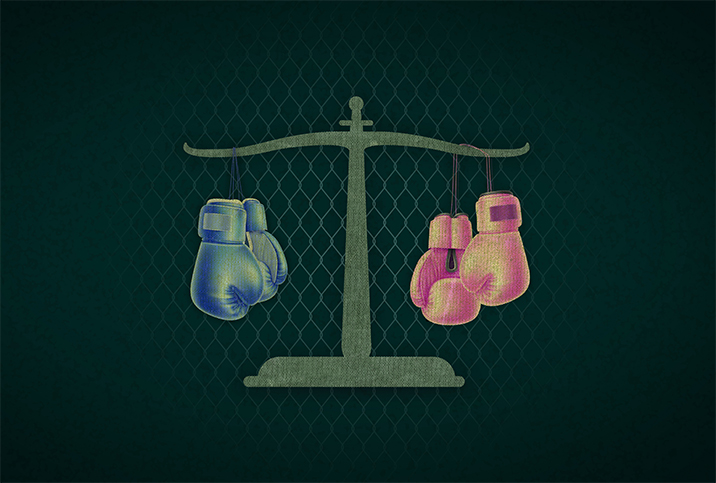How Can I Fight Fair in My Relationships?

Fighting, or arguing, is an unavoidable part of relationships. Big or small, trivial or pivotal, conflict takes on many forms and presents differently for every individual. Though the word "fighting" has a decidedly negative association—and often is—research has shown there is significant merit in it.
The key is not to avoid fighting entirely but to learn how to fight in a healthy, constructive manner so you both can walk away from it having "won" something from the incident.
Unresolved conflict can lead to extensive psychophysiological consequences for all parties, both outwardly and behind closed doors.
The good, the bad and the ugly
The first task is to dismantle the idea that all fights are strictly adverse events.
"A fight can be a good fight if it is in an environment of light—meaning a safe space where someone can referee. Or if you have rules, to speak one at a time and not interrupt," said Audrey Hope, a Los Angeles-based relationship expert. "Fighting is healthy because it has a lot of truth in it. Life and relationships can be madness and it is not a fairytale of happily ever after."
A good fight is one where both partners feel heard and respected, whose outcome is a positive resolution, according to Evie Plumb, a resident sexpert at Here We Flo, a manufacturer of natural menstruation products. Her recommendation was to set ground rules for the conversation to avoid personal attacks.
'The biggest danger for couples who have a habit of fighting or even bickering is that regular stress creates PTSD and they don't realize it.'
"Couples should also use 'I' statements to express their own feelings and needs rather than placing blame on their partner," added Plumb, who is also a London-based ACET-qualified sex educator and the founder of Cliterally The Best, a sex-positive educational platform and podcast.
Couples fight for many reasons. A study in 2019 identified condescension, possessiveness and neglect as the top three conflict triggers in relationships, but rarely are they about the relationship itself. Further, sometimes minuscule arguments mask bigger problems.
"Small things matter because they highlight what we keep inside," Hope said. "If you are angry at your [partner] for not listening to you and you tell [them] to please take out the garbage, and this happens again and again, it's not about the garbage. It's about being dismissed."
Unhealthy fighting in relationships is hazardous.
"The biggest danger for couples who have a habit of fighting or even bickering is that regular stress creates PTSD [post-traumatic stress disorder] and they don't realize it," said Susan Allan, a life coach, founder of Heartspace Solutions and CEO of The Marriage Forum in Santa Barbara, California. "This will eventually create adrenal exhaustion and the more dangerous symptoms of mood swings like depression and chronic anger."
She listed the following consequences:
- Less or no sexual activity
- Psychosomatic manifestations
- Sleep and eating disruptions
- Thoughts of or actual cheating
- Relationship termination or divorce
Hope recalled a client who manifested her own illness to gain attention as a result of feeling neglected by her husband and his habit of shirking his responsibilities.
"We do that as human beings. If we can't get attention one way—from point A to point B—we will make it happen another way to get our needs met," she said.
Her remedy would be to identify each person's needs as well as the real problem at hand so that the miscommunication can be dealt with on a permanent basis. Especially as time is of the essence for conflict resolution.
How to resolve conflict
Hope and Plumb explained the buildup of tension and frustration from unresolved issues can lead to catastrophic implosions and make it more difficult to resolve the issue when it finally comes to a head. Resolution may require a mediator or couples therapy.
"It's important to address issues as they arise and to work together to find a solution that works for both partners," Plumb said.
Hope noted that it's essential for partners to delve into the dynamics of their relationship to solve conflict, and get more in touch with yourself and your connection to each other.
"A deep soul issue or a soul wound is the baggage or luggage we bring to the relationship. If you want to be healthy, you will have someone on board to help you figure it out and navigate the ups and downs of life," she said, warning it has to be a two-way street. "If only one person is getting help and turning on the lights, there is trouble afoot."
Allan said that when things get heated, it's best to stop and use self-soothing techniques—such as her Brain-breathing exercise—before you get upset and say something unplanned. Doing so has the benefits of mental relaxation and clarity, even during stressful situations, allowing the brain to escape survival mode and create solutions with your partner.
Every expert emphasized the necessity of emotional stability throughout arguments. Plumb described de-escalation as a top conflict-resolution skill.
Once you've reached a calm state, Allan's "The 6 Part Conversation" can be used to structure interaction to circumvent arguments.
"It provides specific step-by-step tools to calm yourself, calm your partner, speak with peace and compassion—even about the issues that are troubling each of you—and generate solutions together," she said. "This can be used to create a glorious marriage, a miraculous reconciliation or even a peaceful no-court divorce."
Settings are important, too. Plumb noted that resolving conflict outside of where you sleep is key so that you keep your bedroom as a safe space rather than activating it. In public settings, such as the workplace, maintain decorum by allowing everyone to say their piece and remember that agreeing to disagree is OK. Keeping calm in front of others protects the relationship's privacy and is a sign of mutual respect.
You should also be aware of the function of self-esteem in a relationship.
"Successful relationships require fearlessness and not being afraid to say what you mean and to deal with reality," Hope said. "One needs self-love and care to show up with the power of what they feel, without being scared of what will happen if they speak up. Relationships inspire us to become our best selves."
We're all winners here
Hope explained that communication is the greatest gift in relationships and will help you navigate all stages in the alchemy of love. From the initial honeymoon stage, through the conflict and healing stage, and ending with the stage of long-lasting attachment and love.
"In this [final] stage, you're able to love each other with all the truth and reality of who you both are—it is the best kind of love," Hope said.
Allan said the ultimate goal of an argument should be to learn to communicate and mediate with people you love to achieve true listening, respect and openness.
Plumb suggested it should end with finding a solution or compromise that works for both people and that it's not about proving you're right. After a fight, take some time to recover from the incident and draft a plan for the future.
"Fighting doesn't have to be destructive. It can be an opportunity to strengthen your relationship and deepen your understanding of each other," Plumb said. "It's important to approach conflict respectfully and be willing to work together to 'win' every argument."




















